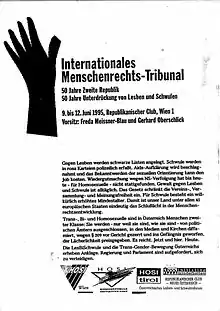International Human Rights Tribunal
The International Human Rights Tribunal (IHRT) was a symbolic tribunal which took place in Vienna, Austria, in June 1995.[1][2][3][4] It was chaired by environmental and human rights activist Freda Meissner-Blau and Gerhard Oberschlick, editor of FORVM, and was dedicated to the persecution of lesbians, gays, bisexuals and transgender persons in Austria from 1945 to 1995.

International committee
As the organizers feared repressions by the Republic of Austria,[5] they asked prominent figures from the international human rights community to join the International Committee and thus protect the endeavour. Amongst the members were Jacques Gaillot, bishop of Partenia, politicians Mel Read (UK), Svend Robinson (Canada), Claudia Roth (Germany) and Terezija Stoisits (Austria), writers Kuno Knöbl, Christine Nöstlinger and Gerhard Roth, developmentalist Robert Chambers (Frankfurt), sociologist Bernd Marin and human rights lawyer Manfred Nowak (both Vienna), political scientist Anton Pelinka (Innsbruck), as well as other academic scholars like Igor S. Kon (Moskow), Asa G. Rachmanova (Saint Petersburg), Douglas Sanders (Vancouver), Theo Sandfort (Utrecht) and Christopher Williams (Preston, UK), as well as human rights activists, publicists und LGBT activists from Belgium, Denmark, France, Netherlands, Norway and Peru.
Senate
Chaired by Meissner-Blau and Oberschlick, the jury of the tribunal consisted of prominent personalities from Austria's civil society, amongst them theologian Kurt Lüthi, philosophers Rudolf Burger and Oliver Marchart, writers Josef Haslinger, Doron Rabinovici and Katharina Riese, politicians Friedrun Huemer (The Greens) and Volker Kier (Liberal Forum), actress Mercedes Echerer, psychotherapists Rotraud Perner, Alfred Pritz and Jutta Zinnecker, judge Norbert Gerstberger, lawyers Nadja Lorenz and Alfred Noll, cultural scientist and activist Dieter Schrage, four journalists, an editor, two unionists, two medical doctors as well as several human rights activists. The composition of the jury changed in each of the seven parts of the tribunal – according to the specific expertise of the jurors. For example, the jury for VII. Discrimination in the general public consisted of four journalists, an editor, a sociologist, writer Haslinger, theologian Lüthi, actress Echerer and psychotherapist Perner.
Prosecution
Human rights activist Christian Michelides served as attorney-general. He headed a team of prominent representatives from the Austrian LGBT movement, amongst them HOSI Vienna activists Gudrun Hauer, Kurt Krickler and Waltraud Riegler and Transgender representative Elisabeth Piesch.
The prosecution brought forward charges in seven different fields:
- Penal Code and constitution
- Civil registry, family, marriage, domestic partnership
- Reparations for Nazi repression
- AIDS and the social consequences
- Prison, psychiatry, armed services, police, right of asylum
- Discrimination in the working environment
- Discrimination in the general public
Testimonies were brought up to document the charges. They reported about police persecution, imprisonment, psychiatric treatment and electroshock therapies, loss of jobs and public humiliation.
In each case the Republic of Austria was charged with neglecting its human rights obligations and therefore broken its own commitment to the Universal Declaration of Human Rights adopted by the United Nations General Assembly in Paris in 1948.
Defence
In six of the seven parts of the tribunal the defence bench remained empty. The Republic of Austria refused to defend itself. Most of the political representatives had either ignored the invitation or passed it on to some department of their own ministry which never replied. Only one lengthy letter from Roland Miklau, departmental head in the Ministry of Justice, explained why he preferred not to participate.
On the first day of the tribunal, MP Johannes Jarolim, member of the ruling Social Democratic Party, sat on the defence bench as amicus curiae, not defending the republic, but rather stating that he agreed with all the changes in the penal code demanded. He referred to the refusal of coalition partner Austrian People's Party which was effectively blocking every move in this field.
Seven verdicts
The Republic of Austria was found guilty in all seven fields.[6] However, the jury not always agreed completely with the demands of the prosecution team. For example, in part I. Penal code and constitution the attorney-general requested the abolition of the pornography law. The jury did not agree on this demand.
References
- Wiener Zeitung, June 10, 1995: "Österreich auf der Anklagebank" (Austria put in the dock)
- Internationales Menschenrechts-Tribunal: 50 Jahre Zweite Republik – 50 Jahre Unterdrückung von Lesben und Schwulen. Wien, 9. bis 12. Juni 1995, Vorsitz: Freda Meissner-Blau und Gerhard Oberschlick.[Programme of the Tribunal]
- Christian Michelides: Die Republik ist schuldig. Homosexualität und Strafrecht in Österreich, Teil 2: Die Verurteilungen seit 1950, in: Lambda Nachrichten 1/1996, 38–40 [The Republic is Guilty: Homosexuality and Penal Code, Part 2: The Verdicts since 1950]
- The IHRT was instigated by Christian Michelides in the Austrian Lesbian and Gay Forum, at its plenary session on November 1, 1994, at the Rosa Lila Villa in Vienna. During the debate preceding the vote, there was criticism of the term tribunal, but Gudrun Hauer convinced the assembly that the reference to the Russell Tribunal was appropriate. Hermes Phettberg raised concerns that the LGBT community in Austria was too weak to carry out such an ambitious endeavour. Nevertheless the motion was approved by a solid majority. In: Die Resolutionen des 4. Österreichischen Lesben- und Schwulenforums Alpenglühen, Diskussionsbeiträge und Entscheidungen des Plenums vom 1. November 1994, Wien 1996, p. 17 [Discussions and Decisions of the Plenary, November 1, 1994]
- At the time of the tribunal, in 1995, two paragraphs of the Austrian penal code still threatened every public endeavour of the LGBT community. §220 penalized the "Advertising for same-sex fornication and the fornication with animals" with up to six months of prison, §221 penalized the "Forming of associations benefiting same-sex fornication" with also up to six months of prison. Therefore all participants of the tribunal could have legally been brought to court and condemned.
- Österreich: Appell des 'Internationalen Menschenrechts-Tribunals' gegen die Diskriminierung von Homosexuellen und Transsexuellen in den Medien. In: IRIS 1995-7:12/36, Datenbank für juristische Informationen (IRIS), Issue 7/1995.